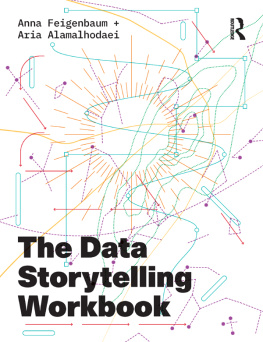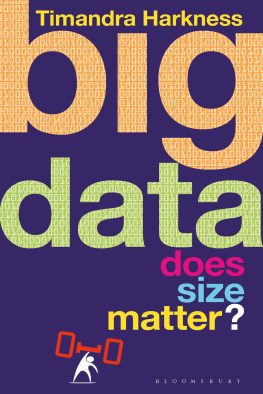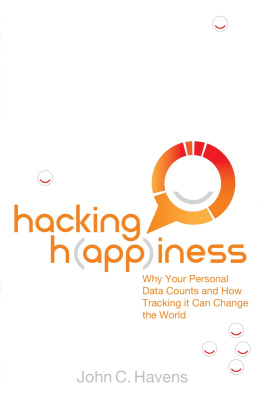
Copyright page
The right of Deborah Lupton to be identified as Author of this Work has been asserted in accordance with the UK Copyright, Designs and Patents Act 1988.
First published in 2016 by Polity Press
Polity Press
65 Bridge Street
Cambridge CB2 1UR, UK
Polity Press
350 Main Street
Malden, MA 02148, USA
All rights reserved. Except for the quotation of short passages for the purpose of criticism and review, no part of this publication may be reproduced, stored in a retrieval system, or transmitted, in any form or by any means, electronic, mechanical, photocopying, recording or otherwise, without the prior permission of the publisher.
ISBN-13: 9781509500598
ISBN-13: 9781509500604(pb)
A catalogue record for this book is available from the British Library.
Library of Congress Cataloging-in-Publication Data
Names: Lupton, Deborah.
Title: The quantified self / Deborah Lupton.
Description: Malden, MA : Polity, 2016. | Includes bibliographical references and index.
Identifiers: LCCN 2015034998| ISBN 9781509500598 (hardcover : alk. paper) | ISBN 1509500596 (hardcover : alk. paper) | ISBN 9781509500604 (pbk. : alk. paper) | ISBN 150950060X (pbk. : alk. paper)
Subjects: LCSH: Self-actualization (Psychology) | Reflection (Philosophy) | Digital mediaSocial aspects.
Classification: LCC BF637.S4 L85 2016 | DDC 158.1dc23 LC record available at http://lccn.loc.gov/2015034998
Typeset in 10.5 on 12 pt Sabon
by Toppan Best-set Premedia Limited
Printed and bound in the UK by CPI Group (UK) Ltd, Croydon
The publisher has used its best endeavours to ensure that the URLs for external websites referred to in this book are correct and active at the time of going to press. However, the publisher has no responsibility for the websites and can make no guarantee that a site will remain live or that the content is or will remain appropriate.
Every effort has been made to trace all copyright holders, but if any have been inadvertently overlooked the publisher will be pleased to include any necessary credits in any subsequent reprint or edition.
For further information on Polity, visit our website: politybooks.com
Dedication
For Gamini Colless, my favourite self-tracker
Acknowledgements
This book draws and expands on the material I have presented in several posts on my blog, This Sociological Life (http://simplysociology.wordpress.com), as well as on four previously published academic articles:
Lupton, D. (2012) M-health and health promotion: The digital cyborg and surveillance society. Social Theory and Health, 10 (3): 22944.
Lupton, D. (2013) Quantifying the body: Monitoring and measuring health in the age of mHealth technologies. Critical Public Health, 23 (4): 393403.
Lupton, D. (2013) Understanding the human machine. IEEE Technology & Society Magazine, 32 (4): 2530.
Lupton, D. (2014) Self-tracking cultures: Towards a sociology of personal informatics. In Proceedings of the Twenty-sixth Australian ComputerHuman Interaction Conference on Designing Futures The Future of Design, 7786. Sydney, Australia: ACM (Association for Computing Machinery).
I thank the two anonymous reviewers of the draft manuscript of this book for their helpful and constructive comments and suggestions.
Introduction
The concept of self-tracking using digital technologies has recently begun to emerge in discussions of the ways in which people can conduct their lives. Monitoring, measuring and recording elements of one's body and life as a form of self-improvement or self-reflection are practices that have been discussed since ancient times. The introduction of digital technologies that facilitate these practices has led to renewed interest in what self-tracking can offer and to an expansion of the domains and purposes to which these practices are applied.
This book is about contemporary self-tracking cultures, analysed from a critical sociological perspective. I use the term cultures to encapsulate the view, adopted throughout the book, that the practices, meanings, discourses and technologies associated with self-tracking are inherently and inevitably the product of broader social, cultural and political processes. The book examines the influences, discourses, technologies, power relations and systems of thought that contribute to the phenomenon of self-tracking, the ways in which this phenomenon is spreading from the private realm into diverse social domains, and the implications of the self-tracking phenomenon for the politics of personal data, data practices and data materialisations.
Self-tracking practices are directed at regularly monitoring and recording, and often measuring, elements of an individual's behaviours or bodily functions. Some self-trackers simply collect information about themselves as a way of remembering and recording aspects of their lives, or to satisfy their curiosity about the patterns in their behaviours or body metrics that they may uncover. Others take an approach that is more specifically goal-oriented, seeking as they do to reflect on and make meaning out of the information they choose to collect and to discern patterns that will work to improve features such as their health, physical fitness, emotional wellbeing, social relationships or work productivity. Some self-trackers collect data on only one or two dimensions of their lives, and only for a short time. Others may do so for hundreds of phenomena and for long periods.
My interpretation of self-tracking in this book rests on the assumption that it involves practices in which people knowingly and purposively collect information about themselves, which they then review and consider applying to the conduct of their lives. Self-tracking differs, therefore, from covert surveillance or means of collecting information on people that result in data sets to which the subjects of monitoring do not have access. As I go on to demonstrate in later chapters, many forms of personal information are generated by people's routine engagements and transactions online or by their movements in spaces that are embedded with sensors or fitted with cameras that monitor them. Only a small proportion of this information is accessible to the subjects of this monitoring. Indeed in many cases people have no knowledge of what data are collected on them, where these data are stored and to what purposes they are used by other actors and agencies. These are examples not of self-tracking, but of tracking of the self by others.
Several terms in addition to self-tracking are used to describe the practices by which people may seek to monitor their everyday lives, bodies and behaviours; such terms are lifelogging, personal informatics, personal analytics and the quantified self. Lifelogging tends to be used to refer to the specific practice of using wearable computing devices such as cameras, sensors, and other computerised and automated ways of collecting personal information over a period of time. The practice is not necessarily about self-improvement but may also be undertaken as a form of computerised memory or as a kind of recording information about a person's life for future generations. Personal informatics and personal analytics are terms that are used most often in academic literature on humancomputer interaction. The title of this book denotes the quantified self a new term for describing self-monitoring practices that was invented in 2007 and has since gathered cultural resonance. While the quantified self overtly refers to using numbers as a means of monitoring and measuring elements of everyday life and embodiment, it can be interpreted more broadly as an ethos and apparatus of practices that has gathered momentum in this era of mobile and wearable digital devices and of increasingly sensor-saturated physical environments.
Next page











